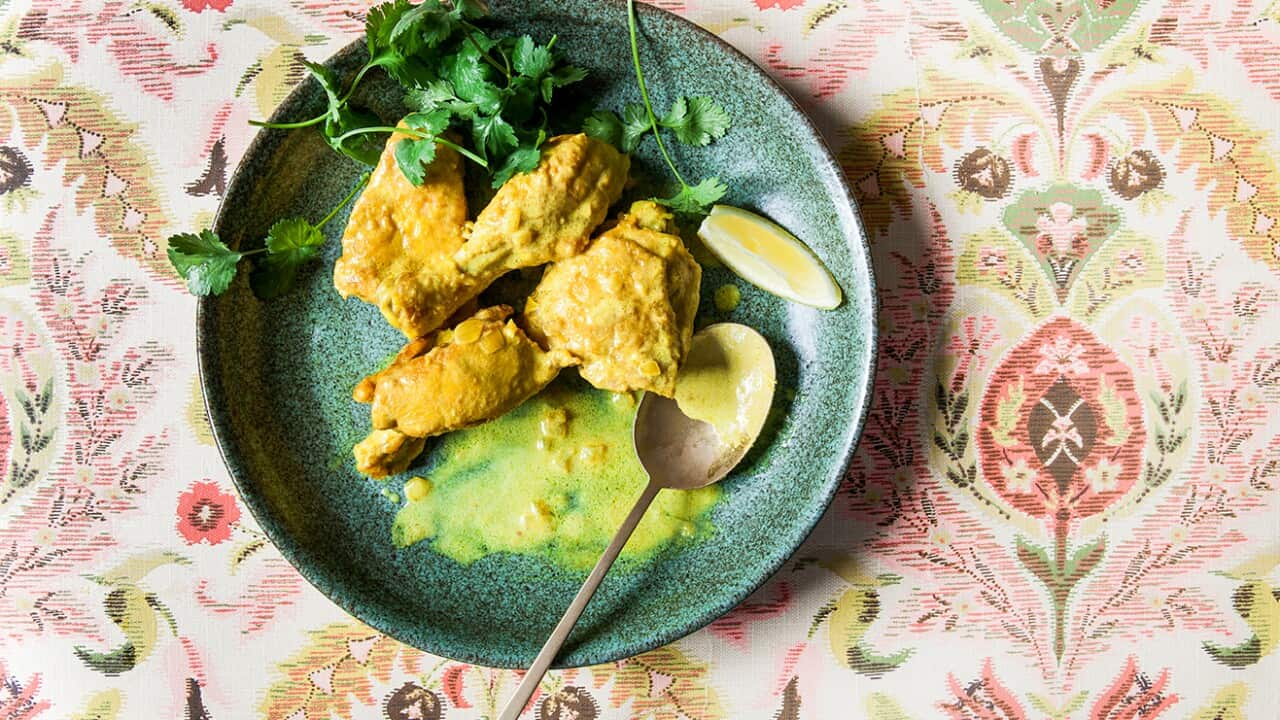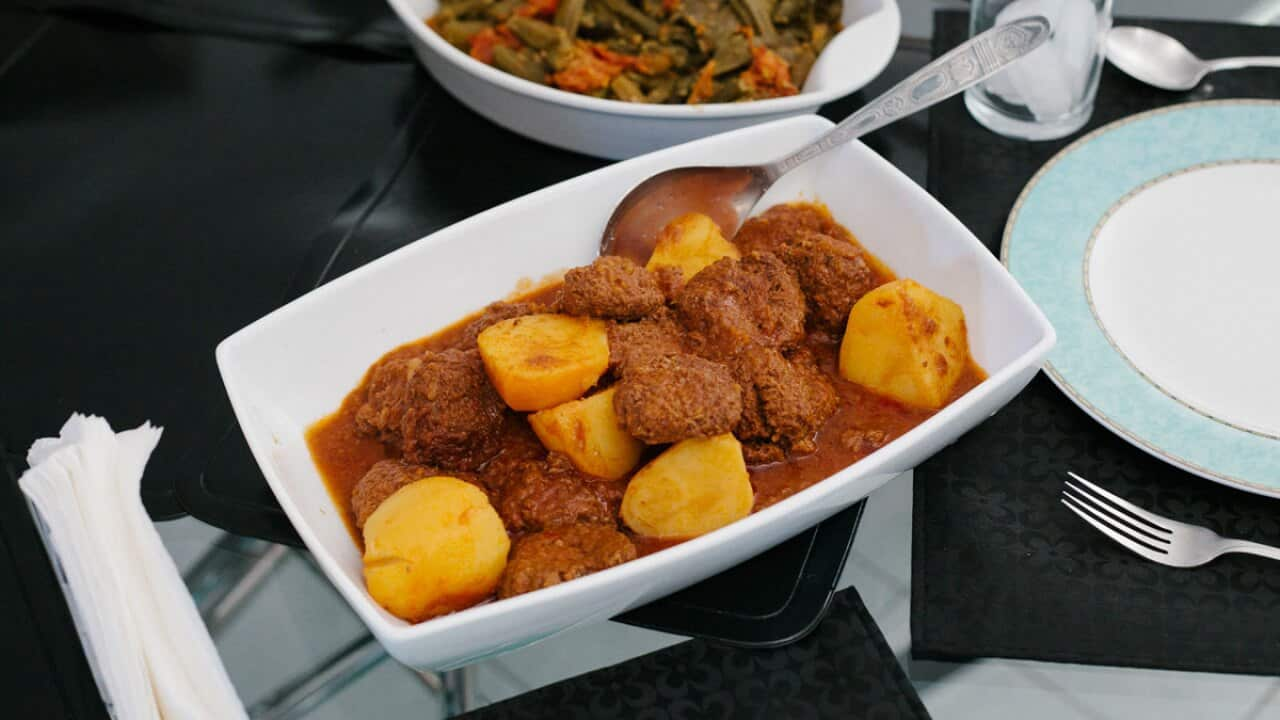As a general rule, food that people line up for is worth the wait.
Sydney's latest must-do queue is a little unexpected. Not only is it located in the depths of the CBD's Met Centre, just down from the food court and towards the entrance to Wynyard Station, but it's all about good deeds and Afghan cuisine.
Kabul Social opened in late August, but word has quickly spread. Not only is it serving up fragrant rice, charcoal chicken, lamb kebabs and dumplings, but it's also serving up a story that is as powerful as the food is delicious.
This social enterprise restaurant employs newly arrived Afghan refugees and donates two meals, one locally and one in Afghanistan, for every meal purchased.
While diners may not know much about Afghan cuisine, head chef Roya says the flavours are familiar because of the influence of the country's neighbours, including Iran, India and Mongolia. "Afghani food, when cooked properly, has a beautiful harmony due to its wide spectrum of flavours and influences. It's a mix of flavours from its history, but there's never an overpowering taste, the food is full of life yet subtle," says Roya.
The food is full of life yet subtle.
Roya explains that the main spice blend is a char masala powder, which is a combination of black pepper, cinnamon, cloves, black cardamom, green cardamom, and cumin. "Garlic, onion and tomato, green and red, form the basis of most dishes," she says.
Kabul Social's most popular menu items are the spiced lamb chapli kebabs and the maash pulao, a fragrant rice and mung bean dish. Those who have cooked rice and beans before know that when something so simple is that delicious, a lot of love has gone into it.
Those who have cooked rice and beans before know that when something so simple is that delicious, a lot of love has gone into it.

Come to Kabul Social for good food. Source: Kitti Gould
"First, we cook the mung beans in the pressure cooker with spices and tomato," she explains.
"We use sella basmati rice with a very long grain. We soak the rice for two hours and blanch it until it is 95 per cent cooked. The water is drained and the rice is placed back on the stove, layered with the mung bean mix. Spices are sprinkled on top of the rice followed by hot oil that brings out the flavour of the spices. Finally, we place the lid on the pot and put it on a very low heat for 30 minutes." The instant interest in Kabul Social has blown away restaurant founder, and co-founder of , Shaun Christie-David. He was also behind Colombo Social, a Sri Lankan social enterprise restaurant in Sydney's inner west.
The instant interest in Kabul Social has blown away restaurant founder, and co-founder of , Shaun Christie-David. He was also behind Colombo Social, a Sri Lankan social enterprise restaurant in Sydney's inner west.

Cooking for the community at Kabul Social. Source: Kitti Gould
"Maybe I'm a bit naive, but we're all good people. And when we're part of something bigger in community, it means something more," he says.
MORE FROM SHAUN CHRISTIE-DAVID

How Shaun Christie-David turned mealtime embarrassment into a social enterprise
"I think people want to help, but it's overwhelming. Like, how do you start? By volunteering? Do I do this? Do I do that? So just come in and do what you got to do anyway. You're gonna get lunch. You're gonna pay $15 or $18, but do something that does a lot more with that money. Employ people, train people, educate people, donate two meals."
Shaun understands how food has the ability to connect people, and that's the point.
Kabul Social has an open kitchen, so you can see the bread being kneaded and stretched fresh every day by Yakut, the meat being grilled and the rice being cooked. You are also being served by a refugee. For many customers, it's their first interaction with an Afghan refugee.
Shaun says, "The food here is Roya's mum's food. There's something nostalgic about eating food that's been prepared from a home recipe. No matter where you are in the world, it doesn't matter what the food is, if it's authentic and home-style and fresh and good, it triggers something deeply emotional.
No matter where you are in the world, it doesn't matter what the food is, if it's authentic and home-style and fresh and good, it triggers something deeply emotional.
"What we're doing is showing the similarity of everybody, not the differences. Food is the easiest way to break it down. You don't get to go out at three o'clock in the morning to get a kebab and don't like Lebanese people - there's no racism in food, there's a common unifier.
He also thinks that eating around a table brings equality. "There's no hierarchy at the table anymore, everyone sits around equally and you all eat the same thing and I think that there's something quite beautiful about that.
"That to me is the most important thing, to connect people."
It all sounds wonderful in theory, but from a business point of view, the restaurant has to create a profit to donate meals. How does it work? "It doesn't!" Shaun laughs.
"We have a not-for-profit, Plate it Forward pumps out 3,000 meals a week. Generally, we get stuff from Coles, suppliers and Sydney markets, but in the last six months there has been no excess produce from them because there has been no produce," he says.
Shaun stresses that Kabul Social is a business that trains its staff and pays its employees fairly. It tries to source donated produce, and negotiate discounts with suppliers and the rent for the space was donated by Mirvac. The aim is to grow the catering side of the business, which will create more employment opportunities and consistent funding so they are less reliant on donations. It's not the easiest way to earn a living, but it's the path Shaun has chosen. "I got a lucky life, so I chose to do something with it," he says.
It's not the easiest way to earn a living, but it's the path Shaun has chosen. "I got a lucky life, so I chose to do something with it," he says.

This social enterprise restaurant employees newly arrived Afghan refugees and donates two meals, one locally and one in Afghanistan, for every meal purchased. Source: Kitti Gould
It would've been easy for him to create another outpost of Colombo Social, but he says there was a greater need for Kabul Social.
"We got a call to help out with the Afghan newly arrived refugees when they first came out about a year ago. Everyone was in hotel quarantine and wasn't getting appropriate food so we started doing these packs that were representative of Afghan household meals, then we got asked by Mirvac to come and check out a space and then we started to kind of meet people. It all happened at the same time,” Shaun says.
"This is about the way that we see people from Afghanistan and the way that society has finally thought about it as they say, 'Hold on, man. I've been lucky enough to know these people, hear their stories, see their hospitality and their food is great.'
"Let's get it so that people can come in here and go, 'Oh, wow'. When you see the team, when you meet them and you get involved in their story, you realise how rich and deep the culture is, and how proud and family-orientated they are.
"Everything about it is so nice, it just had to happen. It's not been easy, but it had to happen."
Love the story? Follow the author here: Twitter and Instagram . Photographs by Kitti Gould for Kabul Social.









